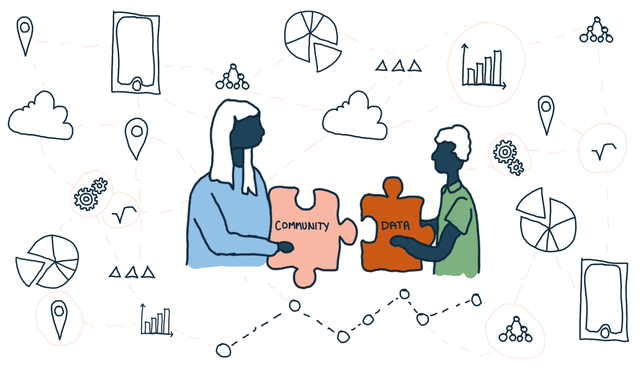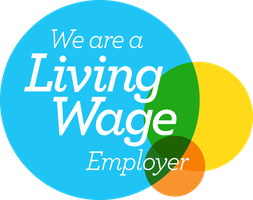Data Democracy in Place-based Change

What is Data Democracy and why is it important?
We are increasingly awash with data as a society to an extent that it can often feel overwhelming and difficult to decide what to pay attention to and perhaps more so, what to trust. Data does not become knowledge until someone has made sense of its meaning and utility and few data sources are without contention. Lies and damn statistics and all that.
A scary fact is that the volume of data held on individuals by companies, governments, social media providers, financial institutions and more is increasing exponentially. As the range of ways in which data is captured increases, we are less and less in control of how that information is used, and of the decisions being made for us according to that data.
Data democracy is about taking back control of at least some of the data about us and how it is understood. It is about transferring more power in data governance to citizens and using lived experience alongside data analytics to understand what data means and what decisions get made as a result.
An example of this is the work of Black Thrive Global. The research team gathered data in order to prove the disproportionate incidents of stop and search in neighbourhoods towards black people. They independently paired it with data around geographical areas with higher numbers of black residents and noticed a trend that showed these stop and searches taking place near schools at the end of the school day. By sharing this data with communities through a community assembly that involved decision makers, they developed a much more nuanced understanding of the impact of the data at a human level and influenced the need for change.
Data democracy is also about communities being empowered to decide what they want to know — to initiate enquiries that examine the issues important to them so they are empowered to influence change. But it’s not only about accessing data, its also about generating it. Researchers from the community have the relationships, insight and trust to be able to collect data that institutions cannot. This relatively untapped data, has the potential to deepen our collective knowledge and shape real systemic change. Collaborating with data scientists and other third sector organisations can support such an approach, providing helpful technical skills and expertise.
Power, therefore, is more equitably shared with communities being active agents in shaping and interpreting their own data, as such their position may shift from the ‘done to’, to the ‘doers’ creating a sense of collective ownership and agency. Shifting such power dynamics can be particularly transformative for the most marginalised groups — those (wrongly) labelled as ‘hard to reach’, where feelings of mistrust towards traditional data-collection institutions can lead to data-gaps, stigmatisation and social isolation.
Approaching data through a democratic lens, therefore, transforms data into a tool for communities to generate their own insights, knowledge and wisdom for social action.
Data Democracy in Action
We have looked at what is happening in practice and seen that data democracy elevates the role of communities to become the storytellers behind the statistics, the governors of data that reflect their lived experiences, both qualitatively and quantitatively — in numbers and in words.
Salus Coop in Barcelona is another brilliant example, through its application of a community-driven model for data governance in the cultivation and use of citizen health data. The democratic agreement of this data cooperative specifies that the data will be used only for non-commercial health research, such as that conducted by public and charitable institutions. The community is therefore the owner of the data, has the power to direct how it is used, and can establish maximum privacy in this use. The data is directed towards innovative healthcare research, from which the community directly benefits and thrives¹.
In the UK, the Civic Data Cooperative within the Liverpool City Region is running the ‘Round ‘Ere’ community wellbeing data hub in Widnes. The project aims to understand the unique local dimensions concerning wellbeing in Widnes², researchers within the community were enlisted to understand the factors that contributed to the local population’s definition of ‘feeling well’. Important qualitative data, such as the level of respect for others or quality of public infrastructure, thus become important metrics in understanding wellbeing within a bespoke area. Through this research, a ‘data commons’ is now being designed for the community where they will have a participatory role in directing the use of the data in the future.
These are two powerful examples of how data democracy illustrates innovation in communities and reclaiming power in the governance of their data to become key agents of change.
What Next?
At Place Matters, we believe that the most effective route to achieving societal change comes from empowering communities to determine their own outcomes. We believe that data democracy humanises data, allowing communities to use a previously inaccessible resource to shape action in the places and spaces that matter to them. The great thing is that we’ve identified over 25 organisations in the UK who work in the data democracy space, including Connected by Data, DataKind, Ratio and MySociety.
We have also identified some community partners in a few localities that are interested in trialling data democracy approaches, including crucial issues such as the increased risk of mortality in Black women during pregnancy and childbirth and Black people being more likely to be detained under the Mental Health Act. We are seeking funding to set up partnerships to take these issues forward as a result of community driven data action! Alongside these inspiring stories, we also need to encourage:
- Statutory systems (NHS, local authorities, Police, etc) to do more to support community organisations to play a role in working with individuals to give meaning to the data that is held about them.
- Community organisations to ask statutory systems to provide them with good quality data and take notice of community-generated data so that communities can better understand and be properly understood.
- Everyone interested in social change to consider how data democracy might shift the needle on seemingly intractable issues by changing the way we understand root causes of problems and empowering communities to lead change. This can be supported by publicly available data sources from the Office of National Statistics (ONS), for example, outcomes by ethnicity — Detentions under the Mental Health Act by ethnicity and unemployment at ward level — Smith’s Wood in Solihull. ONS Local also run free webinars.
Place Matters plans to host a Data Democracy webinar towards the end of the year and you can follow us on Eventbrite to get notified of the date or sign up to our Learning Community.
[1] See Ada Lovelace report on Participatory Data Stewardship pp44–45: https://www.adalovelaceinstitute.org/wp-content/uploads/2021/11/ADA_Participatory-Data-Stewardship.pdf
[2] The Phase 1 Report of the Round ‘Ere project in Widnes: https://civicdatacooperative.com/app/uploads/2023/11/Round-Ere-Report.pdf

